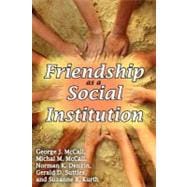
Note: Supplemental materials are not guaranteed with Rental or Used book purchases.
Purchase Benefits
What is included with this book?
| Preface | p. vii |
| The Social Organization of Relationships | p. 3 |
| Organizational Components of Relationships | |
| Organizational Dynamics of Relationships | |
| Organizational Change in Relationships | |
| Conclusions | |
| Boundary Rules in Relationships and Encounters | p. 35 |
| Boundary Rules and the Focus | |
| Threats to the Boundary Rules-Alienation and Change | |
| Conclusions | |
| Rules of Conduct and the Study of Deviant Behavior: Some Notes on the Social Relationship | p. 62 |
| The Nature of Social Relationships | |
| Relational Morality and Propriety | |
| Perceptions of Relational Impropriety | |
| Relational Morality and the Broader Social Order | |
| Friendship as a Social Institution | p. 95 |
| The Cultural and Situational Elements of Friendship | |
| Self Exposure and Institutional Restrictions on Friendship | |
| The Private Culture of Friendship | |
| Conclusion | |
| Friendships and Friendly Relations | p. 136 |
| Desirability of Friendly Relations | |
| Friendly Relations in Contrast with Friendships | |
| Factors Affecting Bases of Association | |
| Organizational Constraints on Association | |
| Processes of Friendship Formation and Development | |
| Friendship Development and Maintenance | |
| Character of Negotiation Within a Stable Relationship | |
| Summary and Conclusions | |
| A Collaborative Overview of Social Relationships | p. 171 |
| The Nature of Social Relationships | |
| Organizational Dynamics | |
| Organizational Change | |
| Interorganizational Relations | |
| Functions and Dysfunctions for Individual and Society | |
| Problems of Research | |
| Bibliography | p. 183 |
| Analytical Index | p. 191 |
| Table of Contents provided by Ingram. All Rights Reserved. |
The New copy of this book will include any supplemental materials advertised. Please check the title of the book to determine if it should include any access cards, study guides, lab manuals, CDs, etc.
The Used, Rental and eBook copies of this book are not guaranteed to include any supplemental materials. Typically, only the book itself is included. This is true even if the title states it includes any access cards, study guides, lab manuals, CDs, etc.